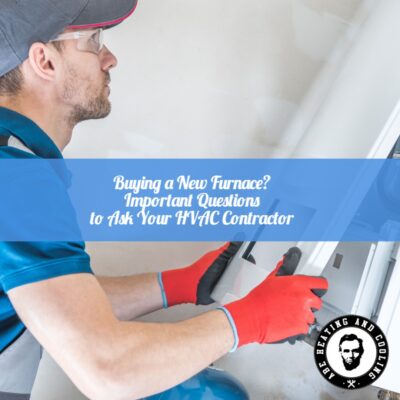“Abe's Heating and cooling were professional and on time. they helped me with two time sensitive projects and did excellent work. I know who I'll be calling if I should ever need an HVAC technician.”
Blog
 You’ve finally decided to buy a new furnace, but there are still several questions that will need to be answered. Should I also replace the air conditioner? What are the most energy-efficient furnace and AC options out there? Will my home’s air quality also improve?
You’ve finally decided to buy a new furnace, but there are still several questions that will need to be answered. Should I also replace the air conditioner? What are the most energy-efficient furnace and AC options out there? Will my home’s air quality also improve?
As a significant investment, choosing the best HVAC system for your home can be challenging. Asking your HVAC/heating and cooling contractor these nine questions first should help you sleep better at night.
This is the hardest decision that homeowners face. Before signing on the dotted line, determine if it makes more sense to repair your old system versus buying new. If your existing system was installed before 2006, it’s probably wise to invest in a more energy-efficient system that meets today’s minimum efficiency standards.
You’ll also need to know which type of system to invest in: packaged or split. A packaged system features heating and cooling components, while a split system only has a condensing unit and furnace coil. In Colorado’s temperate climate, a packaged system with a furnace and air conditioner is a better choice.
Although it might cost more upfront, a modern, high-efficiency furnace or AC will be cheaper to run. Base your financial decision on factors like how much you will use it, the fuel source, and installation cost.
Any potential energy savings and your family’s comfort will both suffer if your new HVAC system doesn’t match your home’s dimensions. When the system is too big, you’ll overpay for performance. An undersized system will struggle to meet demand, forcing you to burn more energy just to keep up.
Depending on where you live and which products you buy, you may be eligible for local rebates, tax credits, special financing, and more.
Maintaining your HVAC system’s components will keep it running optimally and prevent it from conking out unexpectedly. Getting your system serviced twice a year will help prolong its life, save energy, and reduce health risks caused by poor air quality.
Based on government guidelines, a furnace’s Annual Fuel Utilization Efficiency (AFUE) rating must be at 90 percent to be considered high efficiency. Found in the owner’s manual and on the unit, the AFUE value determines how much energy becomes heat.
Smart thermostats, air purifiers, whole-home air filtration systems, and humidifiers are examples of HVAC accessories designed to save you money while improving the air quality and comfort level inside your home.
When replacing an old furnace, keeping the same fuel type and heating method should save you money on installation costs. No matter which furnace or AC you decide to buy, choosing a certified HVAC/heating and cooling contractor will ensure the job gets done right the first time.